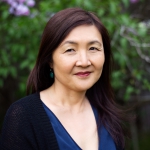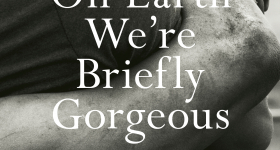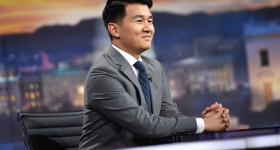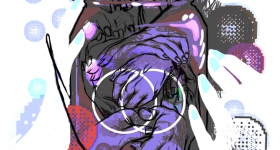In her debut novel, THE INCENDIARIES, R.O. Kwon gives new meaning to the concept of a love triangle. Set on a college campus, we’re introduced to Will, a student who knows a thing or two about fervor, talks about an explosion and sets into motion questions about how that came to be. At the heart of piecing together the mystery behind the explosion is Will’s passionate love for Phoebe, another college student who carries with her a grief that makes her reckless, and her relationship with a man named John Leal, who draws to him those seeking a higher purpose in a cult-like organization. Recently, I was fortunate to have a conversation with Kwon about experiences in her life as a Korean American writer, her writing process, West Coast-East Coast comparisons and Fuji apples.
Jimin Han: Can we start with the origin of the story and how these characters came to you?
R.O. Kwon: At its core, the story came from my having grown up deeply religious, then having left the faith when I was 17. It was incredibly painful. I remember feeling so desperately lonely. I not only couldn't find my experience reflected in my friends and family, but I also didn't see my experience in books — which felt even worse, in a way, because books were where I'd always found companionship and camaraderie. When I set out to write this book I was in grad school, and I was and am still affected by what happened by having lost that faith. I wanted to write for that 17-year-old girl. I wanted to write about what it was to fall out of religion, but I also really wanted to write about what it was to fall into religion. I hoped to write about both parts; the loss and the joy of it. That was the first inspiration for the novel.
JH: Was there a particular incident that caused you to lose your faith?
ROK: No, it wasn't anything in particular. It happened gradually and then all at once. I was raised to be religious and then, in high school, I fell into a fervently charismatic, evangelical Christianity that was very popular in my age group. My high school was something like 80% Asian, predominantly Korean, so I fell into a very fervent, very Korean variety of Christianity. But as I was getting increasingly religious, I was also reading a lot, so I kept encountering other worldviews. According to what I heard when I went to services, a lot of the fictional and nonfictional people I was reading about would be going to hell. It was hard to believe that all these people were condemned to hell because they didn't subscribe to a particular set of beliefs. There’s also the question of evil, which troubles a lot of people who leave the faith: what kind of an all-powerful, omniscient being wouldn’t prevent evil? That question became larger and larger, and eventually it was one I couldn't ignore.
JH: How did this affect your friendships, your relationship to your community?
ROK: My friends were supportive in that they were praying for me, and they wanted to bring me back from apostasy, but I didn't really find companionship in terms of other newly godless people who felt as I did. I can’t really overstate how alone I felt. It was such a different worldview, to have gone from believing that I’d live forever along with everyone I loved — and that there's an omnipotent, wonderful being who's taking care of everything — to more or less believing that, if I’m lucky, I'll get maybe 70ish years of life, after which I’ll turn back to dust.
JH: I think there are many who have gone through that experience, especially as Asian Americans. Was there anything that helped you emerge from that experience?
ROK: That's a good question. Toward the end of that year, I went to college, so I went from a world in which almost everyone I knew was Christian to a world in which almost no one was. And I loved college; I loved it from the minute it started. Learning to appreciate and seek out ephemeral joys became much more important to me than it had been.
JH: Just for context, where did you grow up and where did you go to college?
ROK: I grew up in L.A. and I went to college in Connecticut, at Yale.
JH: Was it sort of a culture shock to be there after L.A.?
ROK: One thing that shocked me was the fruit. After having lived in L.A. for most of my life, I just couldn't — I couldn't fathom how bad the dining hall fruit would be. The first time my mother visited me in college, she brought a giant suitcase full of Fuji apples, which was hilarious and kind of absurd: I was one person. My five suitemates and I had one tiny box refrigerator to share, so there was no way those apples could stay fresh.
JH: So sweet. Speaking of your parents, what was their reaction to your loss of faith?
ROK: I’m very close to my family. My parents and my brother are very religious, and they still essentially believe that I'm going through a juvenile phase, one that I'll eventually snap out of. But my family does subscribe to a liberal version of Christianity in which my mother essentially believes that everyone who's a good person is going to go to heaven.
JH: In terms of the characters in your novel, Phoebe, Will and John Leal, can you talk about how they came to you?
ROK: For the first two years, the entire book was narrated by just Phoebe; I showed her both gaining and losing faith in a Christian God. The book really came to life for me when I divided those experiences, gave them to two separate people. So that's when Will came into the story — he took on more of what had been Phoebe's experience.
JH: And then John Leal, how did he come to be? Such an interesting name too: John Leal.
ROK: John Leal wasn't part of the story for the first two years. Then, one day, while I was volunteering briefly at a Planned Parenthood, I realized that the ongoing, terrible fight over reproductive rights is one way extremist faith makes itself very visible in the United States, and eventually this led to the extremist cult and John Leal.
JH: How about the choices to have John Leal be mixed Korean and white and having Will be white and Phoebe Korean?
ROK: In general, it was really important to me that there be Korean characters in the book. But in terms of choices I made about John Leal being half-Korean or Phoebe being Korean — there wasn't really a choice; they showed up that way.
JH: John Leal's background was really fascinating. How did you decide on that?
ROK: I'd been reading a lot of accounts in North Korea because I had, or have, distant relatives in North Korea. So, for a while, I was reading everything I could find about North Korea because I felt a longing for this part of my life, my family, that I'll never get to know. And eventually, to my surprise, John Leal started taking on a North Korean past. People have asked, "How did you make sure you were getting it right?" But there is no getting it right, not when it comes to a country with the most closed borders in the world. To me, it felt important to show that uncertainty, to inhabit the ambiguity.
JH: This leads me to your title. I saw that you had a different title at one time. Heroics? Which made me think of all the ways in which heroism figured in your book, about how Phoebe feels she should have been heroic in saving her mom’s life, and it's beautifully repeated in all these different ways with Will. And also John Leal is solidly this hero who helped people get out of North Korea. So I thought Heroics was a really effective title, but now your book has a new title.
ROK: Thank you for saying that. When my agent sold the book, Heroics was the working title. After that, I had a period when I was in favor of making the title be Superhuman. My wonderful editor said, "That will make people think it has something to do with superheroes," and I said, "No, but I mean it in the supernatural sense, plus the Nietzschean Übermensch sense. I’m really, really glad I got talked out of that one. As for “incendiaries”: I love the richness of that word, how it has to do with bombs, but also how it contains several of the book’s central obsessions: passion, terrorism. Christians will sometimes say they're on fire for God.
JH: I think that’s great. “Incendiaries” is very evocative. It makes you lean in and question your expectations.
ROK: One of the hesitations I had about Heroics as a title was that it felt a little ironic, maybe too much so.
JH: Right. So while you started with Phoebe and then added Will and John Leal, ultimately the narrative is through Will’s perspective. He tells us Phoebe would have thought this or later he found out this, so her perspective is in there but still filtered through Will.
ROK: For a long while, Will was the only one telling the story. Then, I started adding back in the Phoebe sections, and then the John Leal sections came along. But it was always still Will telling the story, more or less, and trying to piece together what had happened. I’m so interested in how incomplete our knowledge of one another can be. So, as with the parts about John Leal having a mysterious North Korean past, I wanted to show those gaps, those fissures, rather than try to resolve them with the story.
JH: Is there anything you want to say about being an Asian American writer, how you see yourself having been part of the Asian American community in L.A. and then going to New Haven and now living in San Francisco?
ROK: Yes, I live in San Francisco. I didn't read any Korean American writers until after college. It was so revelatory for me to start reading Chang-rae Lee and Alex Chee and Theresa Hak Kyung Cha, and to start seeing any of that part of myself reflected on the page — which is where I spend so much of my time. And now, it's so exciting that I can read and know of so many Asian American writers and Korean American writers, and it's really important to me that I support and amplify other marginalized voices. I'm in a fantastic, supportive karaoke group with other Asian American women writers. We’ll read a book and we'll talk about it, and then we'll go out and sing karaoke and it's so fun. I love them dearly. I wish everyone could have that.
JH: I’m surprised you didn’t read Asian American writers until after college. I grew up in this totally white town and blamed it on that, but you grew up in a predominately Asian American community. I thought that in L.A. there would have been more exposure to Asian American writers and their books.
ROK: I did read a little Amy Tan when I was in high school, but no, I didn't hear of Chang-rae Lee until after college. I hope the situation’s better now — I think Asian American writers are a lot more visible than they were when I was in high school.
JH: What are your thoughts about the #MeToo movement as it relates to the men and women in your novel?
ROK: In my experience of college, as well as my experience of daily life, violence was, and is, an ongoing threat. I don't know what it's like to consider walking home from my subway stop after 9:00 pm without wondering if I'm going to be safe. In my novel, there's a pivotal incident of sexual violence that I tried really hard to take out. I didn't want it to be there for a number of reasons; as I kept trying to rewrite it, though, I realized that it had to be there, that it was what the character would do in that situation. There are ways in which I think and hope the book is deeply feminist.
JH: I like how it raises the question of how reliable you are in knowing yourself, especially at that age in college and at any time in your life. So what are you doing next? What projects are you working on?
ROK: I’ve been working on a second novel for what amounts to about two years. Pretty much all I can say is that it has to deal with women artists and ambition. Also, there’s a lot of sex. Also, I'm editing an anthology with Garth Greenwell of literary fiction that features kink and BDSM, and we're really excited about that.










Comments